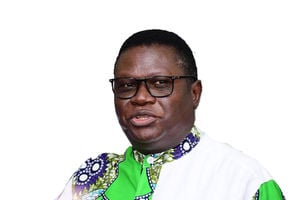Prime
Kampala’s bad roads, poor time keeping

Many roads in Kampala City are in a poor state. PHOTO BY FAISWAL KASIRYE
What you need to know:
Shauna Mottiar recounts her experience in Uganda as a visiting human rights expert in this three part series. Her encounters with Verity, an outspoken researcher from a local NGO, and her remarkably disruptive handbag and later Col. Hugo, a retired English officer, mark the beginning of an exciting adventure.
Kampala
“Madame Shauna?” I looked up at a smiling bellman, “yes,” I said returning the smile. “There is a message for you from Verity.” I looked at my watch confused, it was six o’clock in the evening what would Verity want with me at this hour, “thank you,” I said staring expectantly at the board he was holding – it read “Mr John Cavanaugh”.
“Oh no,” he said quickly, “Verity phoned for you this morning – she said the driver will pick you up at 9.30.”
“Thank you,” I said again – wondering what good that did me now after I had waited in the parking lot this morning since eight thirty for the driver in question who incidentally only arrived at a quarter to 10!
The general confusions and disregard for time had been a recurring feature of my stay in Kampala. People, for the most part, were completely laid back. I had traveled to Uganda to meet with the Human Rights Commission there and Verity, a young researcher from a local NGO, was my guide.
She was tall, elegant, rather scatterbrained but deceptively competent nonetheless. On the morning of our first meeting she had jumped into the car half an hour later than the agreed time, breathlessly introduced herself and then proceeded to recline on the back seat explaining that her sister had just gone into labour and had been admitted to the clinic.
Disruptive handbag
Our driver, Martin, had in the interim pulled away from the side of the road and the car had begun to pick up speed. I was listening intently to Verity with my head half turned towards the back seat and so only saw out of the corner of my eye, a black object bounce off the bonnet of the car. Martin braked sharply as Verity yelled, “oh – my handbag!” She leapt out of the car, retrieved the offending handbag and resumed her place in the back seat somewhat triumphantly. Little did I know that the incident was to mark the beginning of my adventures with that little handbag.
Our first meeting was with the head of the Ugandan Human Rights Commission, and so we made our way through the bustling streets of Kampala to Buganda Road where the commission was situated in an old converted colonial style house. A female security guard at the entrance clad in a shapeless, rather ill fitting security uniform motioned us to sign in.
I began to feel somewhat uncomfortable in my perfectly pressed designer suit and wondered if I should have worn my jeans instead. Verity, in the meantime, was having words with the security guard, “hadn’t she signed that thing yesterday when she came to confirm the appointment” she demanded, “did she look like some kind of rebel from Karamoja or something? If she wanted to do harm wouldn’t she have done it yesterday?” Needless to say the guard had her way and Verity was forced to sign us in.
This she did at snail pace leaning against a wall and scowling. I nervously consulted my watch – we were 20 minutes late, would the head of the Commission still agree to see us? Having duly complied with all security regulations, we were ushered into an inner office and from there shown into the head commissioner’s office.
The head commissioner graciously welcomed us in and made no mention of the fact that we were late – she then introduced us to one of her young colleagues, Rosemary, who would be sitting in on the meeting.
I immediately took a liking to Rosemary, who had the air of someone most accomplished for her age - she was attractive and impeccably dressed (she also gave my designer shoulder bag a look of recognition). Feeling less out of place, I took the seat indicated – the armchair of a very old deep red velvet lounge suite that looked like a relic of colonial English Uganda.
Verity, without waiting for direction, made herself comfortable on the sofa of said lounge suite and to my complete horror removed her shoes and proceeded to tuck her feet up under her.
The meeting got under way and an hour later I was well up to speed on the Human Rights Commission’s work on sensitisation of rights, torture and disarmament – I had made copious notes and was congratulating myself on having dealt with controversial points tactfully when I noticed that Verity looked as though she had fallen asleep. I bade my hosts goodbye rather too loudly in an attempt to rouse Verity – who took her cue thanking Rosemary and the head commissioner for their time – we made our way back to the car.
The drive to our next meeting allowed me to absorb my surroundings without disruptions as Verity reclined silently in the back seat. The streets of Kampala resound with energy that is urbanisation but without the infrastructure to match. It seems as though city planning and development has not transcended colonial times. Toyotas and Nissans populate the roads and everywhere people are either alighting from or climbing into white minibus taxis that mark Kampala’s main mode of public transport.
A rich mix of cultures is ever present with the flowing robes of the Sudanese from across the border and the white Kurta’s of the Muslims going about their bustling business. Martin was an adept driver weaving his way between mini bus taxis and hooting impatiently at impertinent pedestrians. I noticed that he always switched his engine off when stopped at a robot in a bid, he explained, to conserve fuel.
Animals on the street
All in all though there are more traffic circles in Kampala than robots. En route to our meeting with a prominent NGO we rounded a traffic circle upon which there were about a dozen goats and cows placidly grazing – I pointed to them in amazement and asked Martin,
“Whose are those” – I was referring of course to why livestock would be wondering about the city unhindered and unchecked but Martin simply answered somewhat incredulously and with a shrug of his shoulders, “I don’t know.”
Grinning at my foolishness – Martin obviously thought my question was supposed to illicit the name and phone number of the owner of the livestock, I resolved to remain silent and admire the lushness of the vegetation and shrubbery indigenous to the city. The NGO we were visiting was situated in a beautiful, new block of offices, which could only be accessed through series of horrendous dirt roads which seemed for the most part more life threatening than all the pot holes on some of the tarred roads.
I had sat throughout the latter part of the journey with my left hand on the handle bar underneath the window and my right hand firmly grasping the dash board. Verity amused by my careful positioning (she had been lying down in the back seat) assured me that she doubted “the car would fall down any of the ridges.” Thus assured, I began to feel rather nauseous.
On arrival at the NGO offices, we once again had to sign in for security purposes – this time there were no arguments and Verity duly filled in the book after which we proceeded to the director’s office. The executive director was an impressive man – well dressed, well spoken and well informed.
He sized me up quickly and concluded erroneously (well, for the most part anyway) that I am a privileged, misinformed, wet behind the ears, ‘wanna be’ political correspondent from somewhere in the first world. After dealing with the preliminaries, I decided to reclaim my credibility and asked what the NGO community’s views were on multi-party democracy. The director regarded me with a new respect – (the issue had been one of contention for a while in Uganda) – as he launched into the subject of what proved to be a very valuable discussion, there was a knock at the door.
It was his personal assistant holding Verity’s handbag, which she had left at the security desk when signing us in. The director, clearly annoyed at having been disturbed for such a triviality glared at Verity. His energies were wasted, however, as she was too busy reuniting with her hapless handbag to notice.
Part II runs next Saturday
Shauna Mottiar is Senior Research Fellow at the Centre for Civil Society, University of KwaZulu-Natal. She currently manages the Centre for Civil Society Philanthropy and Social Entrepreneurship project focusing on the role of philanthropy in social justice and social change.
Story adapted from Africa Report.


